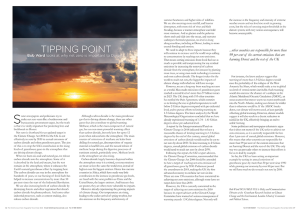Bob Ward looks at why net zero is important to Dorset

Some newspapers and politicians try to make net zero seem like a burdensome and bureaucratic government target, but the truth is that it is vitally important for protecting lives and livelihoods in Dorset.
Net zero is shorthand for an updated target in the Climate Change Act 2008 for the UK to cut effectively to zero by 2050 its annual emissions of carbon dioxide and other greenhouse gases. The aim of this is to stop the UK’s contribution to the rising levels of greenhouse gases in the atmosphere that are driving climate change.
When we burn oil, coal and natural gas, we release carbon dioxide into the atmosphere. Some of it is absorbed by the land and oceans, but the rest remains in the atmosphere, where it enhances the Earth’s natural greenhouse effect by trapping heat. The carbon dioxide can stay in the atmosphere for hundreds of years, so our burning of fossil fuels has helped to increase concentrations by more than 50 per cent since the start of the Industrial Revolution.
We are also increasing levels of carbon dioxide by destroying forests and other vegetation that absorb carbon dioxide for photosynthesis. And some other industrial processes, such as cement-making, also release carbon dioxide.
Although carbon dioxide is the main greenhouse gas that is driving climate change, there are other gases that also contribute to global warming. Methane, which is the main component of natural gas, has an even more powerful warming effect than carbon dioxide, but only lasts for up to 12 years when released into the atmosphere. The main sources of emissions of methane are leaks from drilling for natural gas, decomposition of organic material in landfill sites, and the natural release of methane burps during the digestive processes of ruminant animals, particularly cows. Methane levels in the atmosphere are also rising.
Carbon dioxide largely becomes dispersed within the atmosphere once it is emitted, so concentrations are more or less the same the world over, instead of highest over the biggest emitters. Hence low-income countries in Africa, which have made very little contribution to the increase in greenhouse gas levels, are faced with the same problem as China and the United States, the largest emitters. And because they are poorer, they are often more vulnerable to impacts.
Dorset is already experiencing the growing impacts of climate change. Our temperatures are rising, leading to the earlier arrival of spring weather, but also increases in the frequency and intensity of summer heatwaves and higher risks of wildfires. We are also receiving more rainfall, and heavier downpours, with more risk of river and flash flooding, because a warmer atmosphere can hold more moisture. And as glaciers and the polar ice sheets melt and slide into the ocean, and seawater undergoes thermal expansion, sea level is rising along coastlines, including in Dorset, leading to more coastal flooding and erosion.
We need to adapt to these impacts because they will continue to increase until the world stops adding to concentrations by reaching net zero emissions. That means cutting emissions from fossil fuel use as much as possible and compensating for any residual emissions by increasing the removal of carbon dioxide from the atmosphere, for instance by planting more trees, or using man-made technology to remove and store carbon dioxide. The longer it takes for the world to reach net zero, the bigger the impacts of climate change with which we will have to cope.
However, we are a long way from reaching net zero as a world. Man-made emissions of greenhouse gases reached a record level of more than 57 billion tonnes in 2023. The UK along with 193 other countries has ratified the Paris Agreement, which commits us to limiting the rise in global temperature to well below 2 Celsius degrees compared with pre-industrial level, and to pursue efforts to limiting warming to 1.5 Celsius degrees. The latest analysis by the World Meteorological Organisation concluded that we have already experienced warming of 1.34 – 1.41 Celsius degrees above pre-industrial level.
A report by the Intergovernmental Panel on Climate Change in 2018 indicated that to have a reasonable chance of limiting warming to 1.5 Celsius degrees by the end of this century, annual global emissions of carbon dioxide would need to be cut to net zero by about 2050. To limit warming to 2 Celsius degrees, annual global emissions of carbon dioxide would need to reach net zero by about 2070.
Following this report, the UK’s expert advisers, the Climate Change Committee, recommended that the Climate Change Act 2008 should be amended to have a target of reaching net zero emissions of all greenhouse gases by 2050. Parliament passed the amendment in 2019, making the UK the first advanced economy to enshrine net zero in law. There are now 138 countries that have committed to achieving net zero emissions, although some have set target dates later than 2050.
However, the UK is currently committed to the target of achieving net zero emissions by 2050 because its expert advisers at the Climate Change Committee have warned of serious consequences if warming exceeds 1.5 Celsius degrees. Not only will the increase in the frequency and intensity of extreme weather events and sea level rise result in growing costs, but the risks of crossing major thresholds in the climate system, with very serious consequences, will become unacceptable.
For instance, the latest analyses suggest that warming of more than 1.5 Celsius degrees would raise the probability of the collapse of the West Antarctic Ice Sheet, which would make a rise in global sea level of several metres inevitable. Such warming would also increase the chances of a collapse in the Atlantic Meridional Oceanic Circulation (AMOC), an ocean current that moves warm sea water northwards into the North Atlantic, making our climate far milder than it otherwise would be. If the AMOC breaks down, our climate will start to cool, at least partially offsetting global warming. However, climate models suggest it will also result in a drastic reduction in rainfall in the UK, effectively bringing an end to arable farming.
Some politicians and newspaper columnists argue that it does not matter if the UK seeks to achieve net zero emissions, as it is currently responsible for less than 1 per cent of annual global emissions. However, this means that other countries are responsible for more than 99 per cent of the current emissions that are harming Dorset and the rest of the UK. The only way we can persuade others to increase their efforts is for us to lead by example.
So far, the UK has been setting an important example by cutting its annual emissions of greenhouse gases by more than 50 per cent since 1990 while growing our economy by over 80 per cent. But we still have much to do to reach net zero by 2050.



